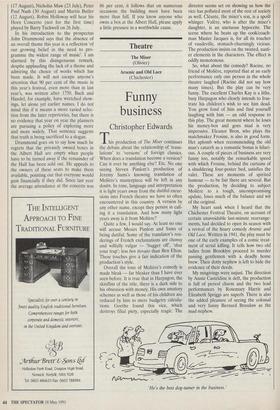Theatre
The Miser (Olivier) Arsenic and Old Lace (Chichester)
Funny business
Christopher Edwards
This production of The Miser continues the debate about the relationship of 'trans- lations' to 'versions' of foreign classics. When does a translation become a version? Can it ever be anything else? Etc. No one seeing Steven Pimlott's production of Jeremy Sams's knowing translation of Moliere's masterpiece will be left in any doubt. In tone, language and interpretation it is light years away from the dutiful excur- sions into French theatre we have so often encountered in this country. A version by any other name, except they persist in call- ing it a translation. And how many light years away is it from Moliere?
Quite a few, I would say. At least no one will accuse Messrs Pimlott and Sams of being dutiful. Some of the translator's ren- derings of French exclamations are clumsy and wilfully vulgar — 'bugger off', 'shut your trap'; less ben trovato than Ben Elton. These touches give a fair indication of the production's style. Overall the tone of Moliere's comedy is made bleak — far bleaker than I have ever seen before. It is true that in Harpagon, the skinflint of the title, there is a dark side to his obsession with money. His own amatory schemes as well as those of his children are reduced by him to mere budgetry calcula- tions. Goethe found this vice, which destroys filial piety, especially tragic. The director seems set on showing us how the vice has polluted most of the rest of society as well. Cleante, the miser's son, is a spoilt whinger. Valere, who is after the miser's daughter, is an unctuous hypocrite. The scene where he beats up the cook/coach- man Master Jacques is, for all its touches of vaudeville, stomach-churningly vicious. The production insists on the twisted, nasti- er elements in the characters. The effect is oddly monotonous.
So, what about the comedy? Racine, no friend of Moliere, reported that at an early performance only one person in the whole theatre laughed (Racine did not say how many times). But the play can be very funny. The excellent Charles Kay is a lithe, busy Harpagon who clearly intends to frus- trate his children's wish to see him dead. You grow fond of him and find yourself laughing with him — an odd response to this play. The great moment where he loses his money-box and goes mad is very impressive. Eleanor Bron, who plays the matchmaker Frosine, is also in good form. Her aplomb when recommending the old man's catarrh as a romantic bonus is hilari- ous. A couple of pieces of business are very funny too, notably the remarkable speed with which Frosine, behind the curtains of a shuddering four-poster bed, satisfies the valet. These are moments of spirited humour — to be fair there are several. But the production, by deciding to subject Moliere to a tough, uncompromising update, loses much of the balance and wit of the original.
My heart sank when I heard that the Chichester Festival Theatre, on account of certain unavoidable last-minute rearrange- ments, had decided to open its season with a revival of the hoary comedy Arsenic and Old Lace. Written in 1941, the play must be one of the early examples of a comic treat- ment of serial killing. It tells how two old ladies from Brooklyn proceed to murder passing gentlemen with a deadly home brew. Their dotty nephew is left to hide the evidence of their deeds.
My misgivings were unjust. The direction by Annie Casteldine is deft, the production is full of period charm and the two lead performances by Rosemary Harris and Elizabeth Spriggs are superb. There is also the added pleasure of seeing the colossal and very funny Bernard Bresslaw as the mad nephew.
`He's the best dog-tamer in the business.'


























































 Previous page
Previous page